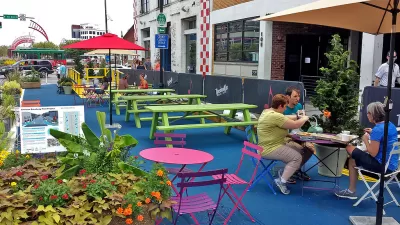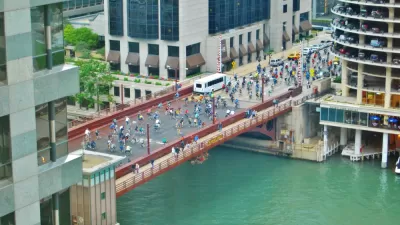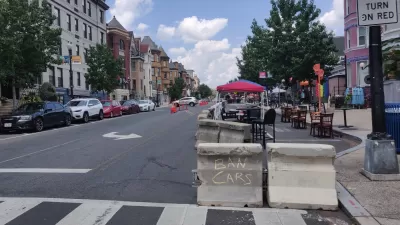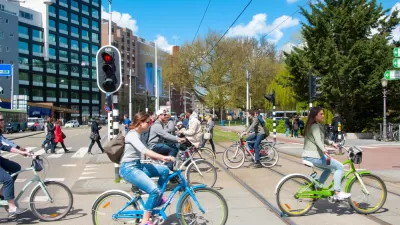In many cities, the public realm saw a drastic shift towards pedestrian-oriented infrastructure. The L.A. Times editorial board argues we should keep it that way.

"Let's keep the 'slow streets'" and other pandemic-induced infrastructure that cities implemented in the last year, says the Los Angeles Times editorial board.
"One of the bright spots of the last year has been cities’ willingness to swiftly transform the public realm into open-air spaces that can be used by people to safely gather, exercise and dine with social distancing." Now, it will take more political will to keep the beneficial changes. Maintaining the changes will require "consistent public funding for maintenance and ongoing community engagement and partnership in order to make them successful."
"Sure, it was a pretty easy decision to cordon off some streets and parking spaces in the first months of the pandemic, when many businesses were shuttered, commercial districts looked like ghost towns and people were stuck at home, trying to flatten the curve. But now, as life returns to some semblance of normality with traffic and commerce on the rise, too many cities are planning to revert to the old car-centric way of managing public spaces."
A Boston University survey of 130 mayors showed that few of them intended to make the changes in their city permanent, despite indications that more people will continue to walk and bike after the pandemic.
"Even before the pandemic, there was a growing recognition that public spaces are too oriented toward cars, and that’s created a vicious cycle. It hurts the quality of life in neighborhoods by making residents feel unsafe and uninspired to walk, bicycle or take transit. It discourages people from getting out of their cars, which makes it harder to cut the greenhouse gas emissions responsible for climate change."
We would be missing a huge opportunity by ignoring the possibilities that pandemic streets opened up, the editorial argues. "Let’s not roll back progress toward safer, healthier cities."
FULL STORY: After the pandemic, outdoor dining and ‘slow streets’ should live on

Planetizen Federal Action Tracker
A weekly monitor of how Trump’s orders and actions are impacting planners and planning in America.

Congressman Proposes Bill to Rename DC Metro “Trump Train”
The Make Autorail Great Again Act would withhold federal funding to the system until the Washington Metropolitan Area Transit Authority (WMATA), rebrands as the Washington Metropolitan Authority for Greater Access (WMAGA).

The Simple Legislative Tool Transforming Vacant Downtowns
In California, Michigan and Georgia, an easy win is bringing dollars — and delight — back to city centers.

The States Losing Rural Delivery Rooms at an Alarming Pace
In some states, as few as 9% of rural hospitals still deliver babies. As a result, rising pre-term births, no adequate pre-term care and "harrowing" close calls are a growing reality.

The Small South Asian Republic Going all in on EVs
Thanks to one simple policy change less than five years ago, 65% of new cars in this Himalayan country are now electric.

DC Backpedals on Bike Lane Protection, Swaps Barriers for Paint
Citing aesthetic concerns, the city is removing the concrete barriers and flexposts that once separated Arizona Avenue cyclists from motor vehicles.
Urban Design for Planners 1: Software Tools
This six-course series explores essential urban design concepts using open source software and equips planners with the tools they need to participate fully in the urban design process.
Planning for Universal Design
Learn the tools for implementing Universal Design in planning regulations.
Smith Gee Studio
City of Charlotte
City of Camden Redevelopment Agency
City of Astoria
Transportation Research & Education Center (TREC) at Portland State University
US High Speed Rail Association
City of Camden Redevelopment Agency
Municipality of Princeton (NJ)





























